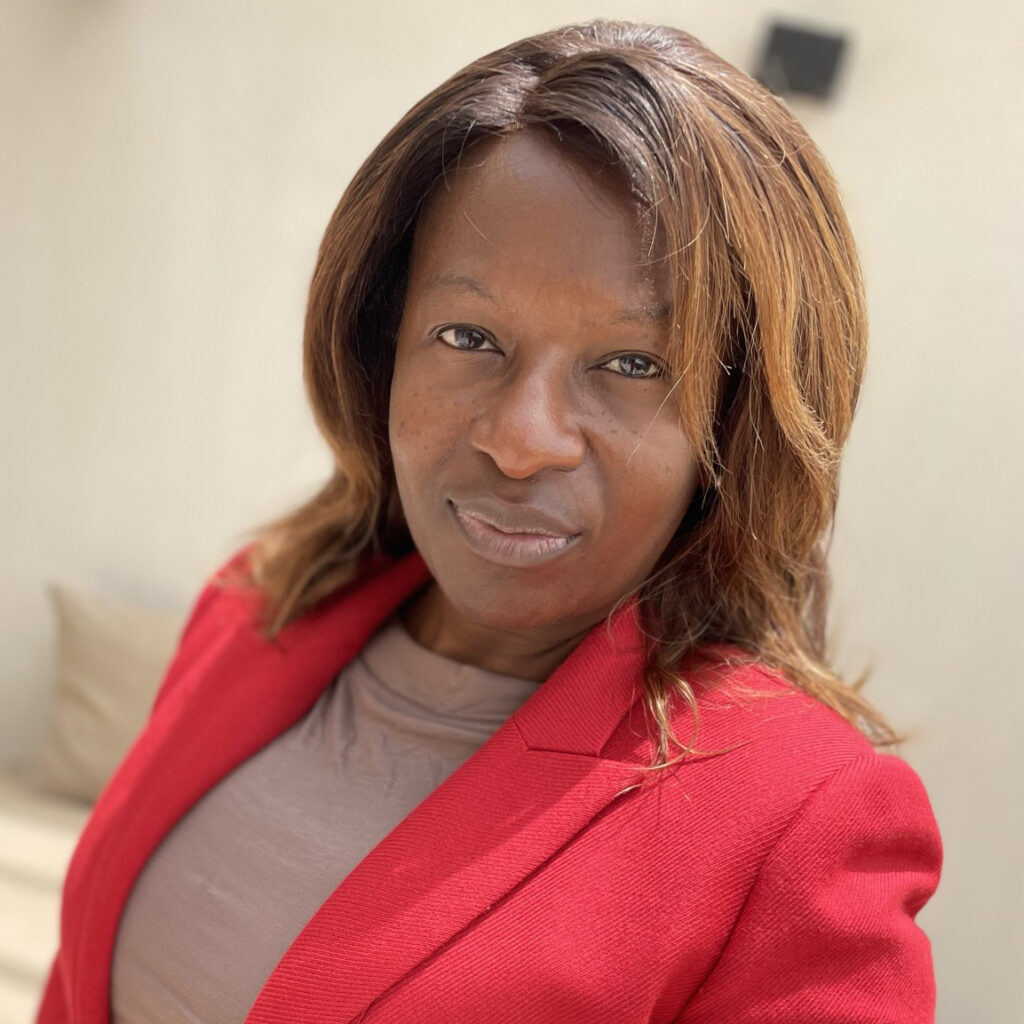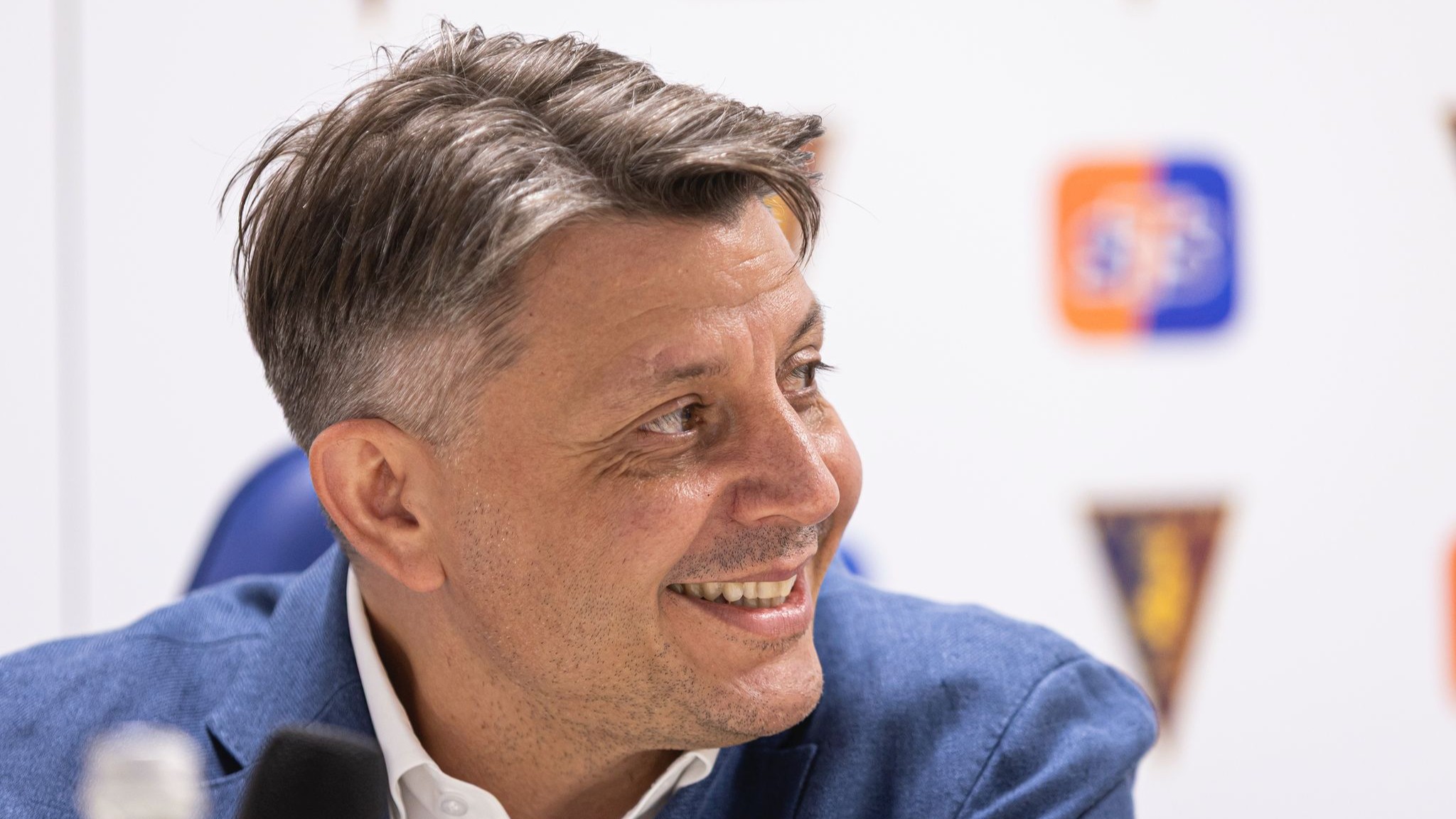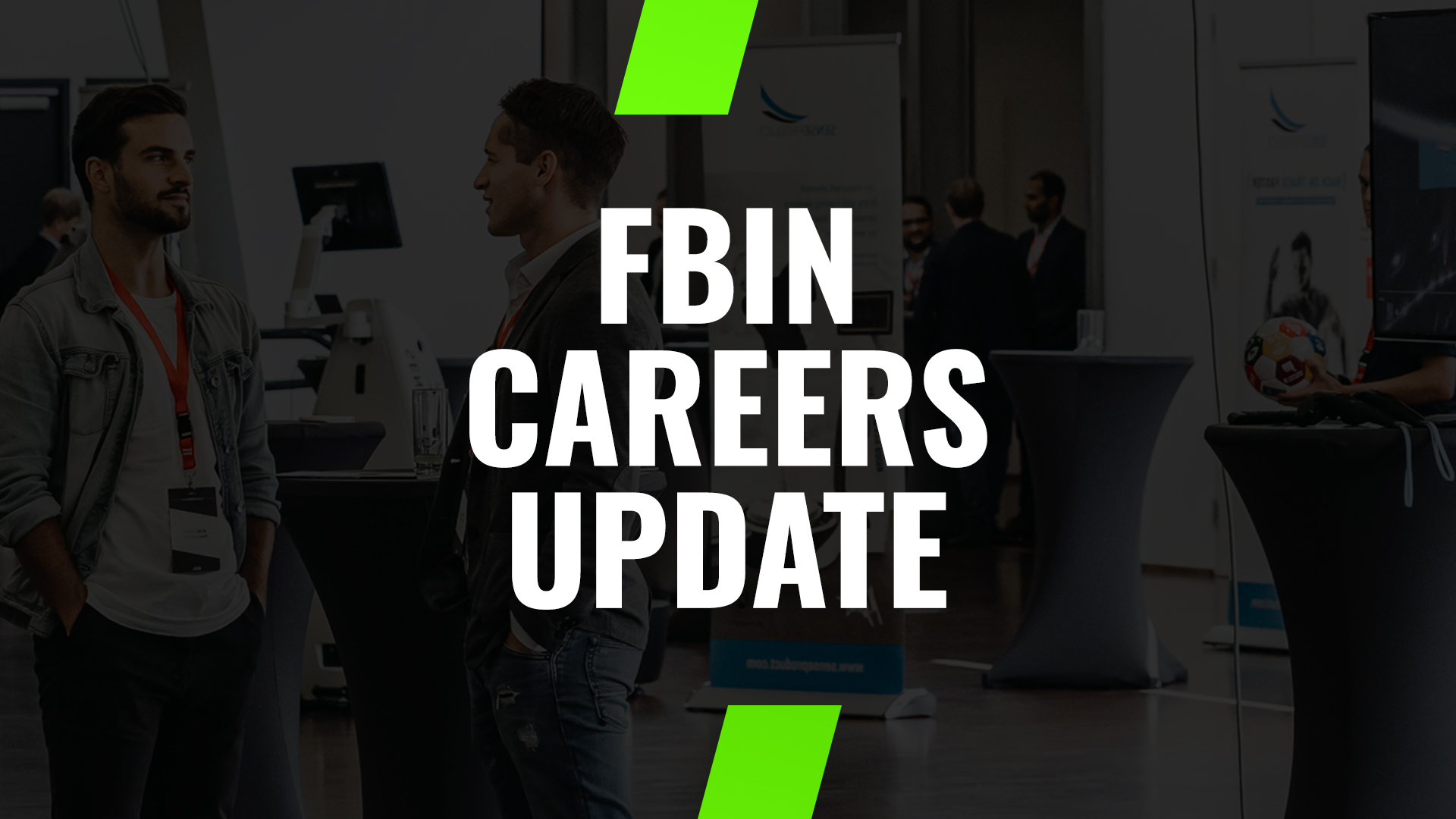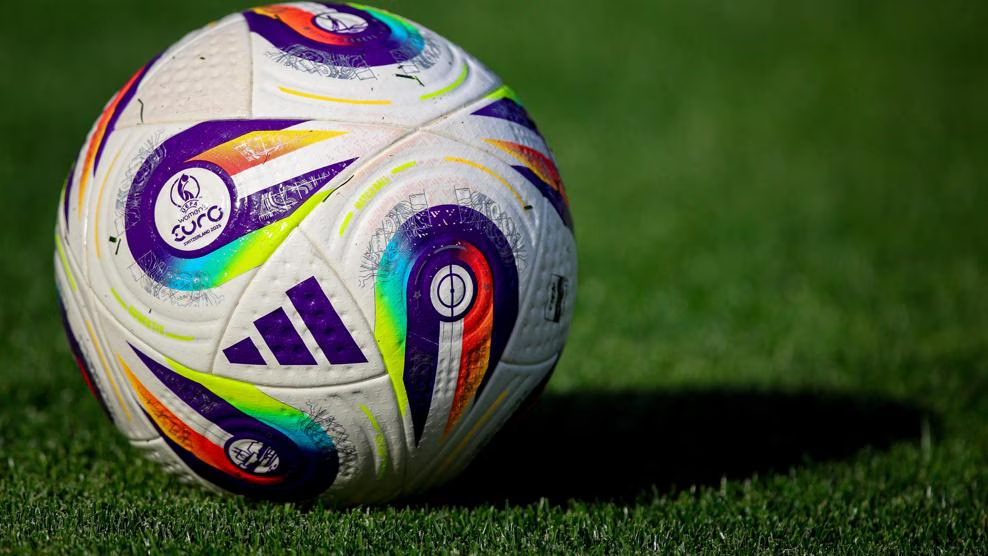Abi is the first woman to hold a C-suite position at CAF. Abi sat down with FBIN to discuss the importance and the role of governance, positive change, learning from best practice, educating the workforce and the importance of true partnerships.
Questions by Betty Ruzickova
Hello Abi, first of all, thank you for taking the time to talk to me today and for sharing your story with our FBIN Members as well as the casual readers. I thought that it would be nice for you to introduce yourself in your own words, where you’ve come from and where your professional journey has taken you so far. It is a very impressive CV that I am looking at here.
Thank you so much for the warm welcome. I’m super excited about sharing my experience and my sports insights. Thank you also for acknowledging my career adventures, as I call them, my career has been really varied.
My name is Abiola Ijasanmi and I’m the Chief Operations Officer of CAF; that’s the Confederation of African Football, which is the governing body for African football. So we’re the African equivalent to UEFA. I’m a lawyer. I have a master’s in international commercial law, and I’m also a member of the English bar. Prior to my appointment as a COO with CAF and relocating to Egypt, which is where the headquarters is. I was based in London initially as a director of legal compliance and corporate affairs for, gosh, almost a decade, eight years for an English luxury Travel Concierge business, very different to what I’m doing now. But believe it or not, there are similarities.
I was working with many different global brands in the complex regulatory framework of the airport space in different jurisdictions and different airports around the world. I oversaw various different functions in that role as well. (Human resources, governance…) So that’s why I started to transition into operations. Eventually, I became the director of African operations when an opportunity for the business to expand into Africa presented. I jumped at it because I’ve always wanted to spend more time on the African continent. I would then spend my time between Ghana and our London office.
You did have a sports connection early on as well…
Yes, I was a sports agent for basketball. A fantastic and unique situation. An agency owned by former pro US players, based in London. At the time, I was one of only two female agents in Europe that dealt with basketball. We placed un-drafted players, so if they weren’t drafted into the NBA, or the development league, but still wanted to play. We focused on the top pro markets outside the US, which at the time were France, Italy, Spain, and some secondary markets. Poland, Lithuania, the Middle East and Lebanon So that’s kind of how I began my journey into the business of sport.
I developed a flavour for the nuances of placing female players. Male player just wanted to play anywhere they could. Whereas the female players were a little bit more inquisitive. They did a lot more research, and were a little more concerned about accommodation and what the transition into a different country would be like. So with those characteristics in mind, I found a successful niche in the women’s market. We set up a Women’s division which I headed up as VP. So that’s my career adventure in sports from the beginning.
That’s a very nice overview. You’ve been in both high profile and high pressure environments, so that must have prepared you very well for the role that you’re currently in now. In hindsight, are there any key moments or lessons that helped you prepare?
You know what, Betty, I feel that reflecting back on my professional journey up until this point, everything I’ve done so far, has kind of crafted me for my current role, my legal background, having previously working in the sports industry, my experience in senior management and operations in an international capacity and working closely with reputable global brands.
But there have been a couple of particularly pivotal moments and learnings.
Daryll Reshaw, one of the owners of the sports Marketing agency where I worked was quite visionary in his ideology and approach which was to professionalize sports marketing. He did not hesitate to give me the opportunity to work in what was a very male-dominated sport because he was confident I had the skill set that the role demanded and that I would add value to his business. I also learned from him what great leadership should look like: it welcomes talent from all place. it’s not only open to new ideas and possibilities, but supports and defends them and it creates an environment of safety, trust and cooperation where everyone can develop and thrive.
The other pivotal moment for me was moving to Ghana and working throughout Africa. I gained insights into the unique challenges and opportunities that exist in each of the African countries we worked with, ultimately equipping me with a well-rounded perspective of the huge diversity of culture and business practices across the African continent.
Coming back to the present, what does it mean being the COO at the CAF ?
It means I juggle lots of balls and wear lots of hats!
Fun facts: I am the first person to hold a COO title at CAF in the organisation’s history. I am also the first woman to hold a C-Suite leadership role at CAF in its history. Yes. The face of leadership and the approach to leadership is evolving everywhere, which is fantastic.
My role is second in command in the administration. I report to the CAF General Secretary, Mr. Véron Mosengo-Omba. He guides the overall direction, the long-term success of the administration and he sits underneath the CAF president, Dr Patrice Motsepe.
When Dr Motsepe was elected in March 2021, he outlined an ambitious, aspirational but achievable 10-point plan to make African football globally competitive and commercially sustainable by 2025, His plan focuses on transformation, investment and support in the key areas of Governance, Financial Sustainability, Infrastructure, Youth and Women’s Development, Digital Transformation, Commercialisation, Education and Capacity Building and Medical Support Systems.
My focus is on the day-to-day operational aspects of delivering the strategy that will see Dr Motsepe’s plan realised and I leverage my experience in both operations and governance to do this,
We have 8 business units at CAF: Competitions, Development, Commercial, Communications, Finance, Legal, Member Associations and HR, IT & Services. I also lead the Governance, Risk and Compliance unit which is crucial to the transformation of operational governance at CAF and sets the standards. I work across all of the units and closely with the executive management team to align operations, manage resources, and drive the organisation towards its goals, so I’m a bit like a conductor of an orchestra, ensuring that all the moving parts of this incredible institution work harmoniously as we go.
So it’s a very busy day…
Indeed! Fast and energetic, but in a controlled way. It’s about synchronising the efforts of various departments, problem-solving on the fly, and working towards the overarching goal of promoting African football and its growth. It’s a role that requires adaptability, leadership, and a deep love for the beautiful game that brings us all together.
To set the landscape for our conversation, would you be able to provide us with a more concrete idea of the scale and the scope of CAF? How many associations, players, teams, leagues, competitions fall under CAF’s purview. How many people does football employ in Africa? Is it possible to say?
Well, CAF is of course the governing body of Africa, therefore, responsible for establishing and enforcing the regulations, procedures and guidelines of the game within our jurisdiction, which come from the framework of FIFA, the global governing body.
We are also responsible for issuing all of the licenses for clubs that participate in African leagues.
A few stats:
- In terms if size, we are second in the world to UEFA. We have a 54-member association, UEFA has 55.
- We have 150 000 registered female players
- 55,000 registered male players
- We stage over 700 matches annually.
As a sport, football is by far the most popular in Africa and if you have never had the opportunity to come to the continent and attend a match, you should because the energy is incredible. African football fans are legendary.
“Football on the continent of Africa is the biggest sport by far, and it holds at least 60% of the market share in terms of population.”
As the Overseer of Governance at CAF, you play a vital role in ensuring transparency and accountability within the organisation. Can you tell us about some of the initiatives or measures you have implemented to enhance governance practices and foster integrity within CAF?
Well, many confederations including CAF have had their feet held to the fire and we are on our own journey of transformation and modernisation. I want to really emphasise and embed good governance into everything we do going forward and lay a good foundation for the future.
We have been able to build up governance principles and best practice from scratch and instil those into the policies, processes, mechanisms and structures that have been drafted thus far. It allowed us to think about governance by design, and what I mean by that is everything that we think about is driven by governance principles from the beginning and embedded into our DNA, rather than having to backtrack on ourselves and put measures in afterwards or as a reactionary measure.
It’s been both challenging and rewarding getting our governance framework in place. Within the spirit of fostering transparency and accountability we’ve developed an effective compliance framework, separated our compliance team, from legal and policy to give compliance real autonomy in terms of the decisions that are made. It is the same structure as all other Confederations.
We’ve created a delegation of authorities, which is a pretty standard document for most organisations, which allows us to really take a deep dive into our daily functions, literally from every role that’s in the organisation, and really set a good standard of governance in terms of signing contracts, threshold amounts, making sure that we follow through on obligations or actions, and that we haven’t missed a thing. We also have a new risk management framework in place.
Those are the initiatives that we’ve been focusing on so we can now build out on top of that foundation. Including how we educate our staff at the HQ and how we educate our Zones and our MAs (Member Associations – editor’s note) and develop a new operational culture within African football. We’ve been supported by some fantastic outside organisations to do this too.
That’s very nice to hear, that education is so high on the list of priorities. For the game to get better and cleaner, learning has to be on the forefront of what the leaders promote, so that we can move forward and so that the people who are qualified become even more professional within the scope of their roles, I suppose.
You’re so right. This is why at CAF I have implemented a lot more online education such as anti-bribery, corruption, data protection, the real key legal and ethical elements that should be priorities of any businesses, not just a confederation. We are a global organisation, we are a professional organisation and our mindset and practices now reflect that.
“We need to think about international best practices and to move things forward using education and training.”
Governance plays a crucial role in international football, ensuring transparency, fairness, and ethical practices. From your perspective as the Head of Governance at CAF, how do you see the landscape of governance in international football evolving, and what steps do you believe are necessary to further enhance governance standards across the football community?
The landscape of governance in international football is continually evolving as various stakeholders recognize that transparency, accountability, and integrity are of paramount importance within the sport.
To further enhance governance standards in African football, there are several steps we are taking and to name a few, we have strengthened and will continue to strengthen our regulatory frameworks. We will continue encouraging transparency and disclosure in financial operations and decision-making processes, and we’ll continue to promote open reporting mechanisms,
We are undergoing a digital transformation at present and embracing technology and digital tools to improve governance practices, including data protection, financial monitoring, and anti-corruption measures. We’re implementing secure and transparent systems for player registrations, financial transactions, and fan engagement that will enhance governance standards and reduce the risk of malpractice.
We respect the importance of independent oversight and compliance to monitor and enforce governance standards, so we’re working closely with PwC to strengthen our controls and it has been a really great exercise.
Shaping sustainable and accountable governance in the international football community requires vigilance and adaptability to address emerging challenges. It is an ongoing process that requires commitment and collaboration from all stakeholders, but I think we’ve come a long way in a short time.
You spoke about the importance of partnerships and how certain partners are willing to educate your team helps share their knowledge, could you be more specific? What is the beauty of working with these special partners who are looking to not “just slap a logo next to yours”, but to help in the long term strategy and knowledge sharing? What key resources does CAF provide to individual associations?
Yes, we have some really great partnerships who require us to have high governance standards. We want to build on that and continue to attract other really great partnerships and sponsorship partners both in Africa and internationally.
We welcome our partners to communicate openly and clearly with us about the governance standards they expected as part of our agreement and we communicate the same to our partners. This includes sharing relevant policies, codes of conduct, and any legal or regulatory requirements that need to be followed.
We encourage our partners to organise training sessions, workshops, share resources and offer expert guidance all in an effort to educate our staff and other relevant stakeholders about governance best practices. These sessions can cover whatever topics are required such as ethical decision-making, financial management, compliance with laws and regulations, and conflict of interest.
We’re also happy to collaborate with our partners on specific governance initiatives.
And of course, ongoing evaluation is essential to monitor compliance with governance standards including feedback and constructive suggestions which can help both CAF and our partners to continuously improve our governance processes respectively.
We actively engage in these actions with our partners because it strengthens both of our governance frameworks, ensures alignment with shared values and promotes a culture of good governance within the partnership and beyond.
To answer your question about key resources we provide to our Member Associations, It is a bespoke offering because each of our 54 MAs are on a different stage of football development. Some very advanced, some just beginning and everything in-between, but at minimum we help our MAs through a package of resource we call toolkits. A toolkit contains a basic framework of what the expectations are from CAF and FIFA, then we support the MA to embed that framework into their organisation and comply with all the elements.
In addition to the toolkit, we offer various resources and support to our MAs including development programs, financial and technical support and assistance, training and education, tournaments and competitions as well as governance and admin support. We also promote partnerships among MAs to foster collaboration, knowledge sharing, and best practice dissemination.
We encourage our MAs to engage with and utilise the available resources to enhance the development and growth of football within their respective countries.
Coming back to the 10-point plan, and getting African football to a competitive standpoint, within world football by 2025… Is there a conversation about sustainability next to being competitive?
Sure, sustainability has become an increasingly important aspect not only in the world, but in the world of sports, including football and while Dr. Motsepe’s 10-point plan does not explicitly outline social sustainability as a standalone point, there is a clear commitment to addressing social issues and promoting social responsibility and positive social impact through football development and several points in his plan directly address social aspects within African football.
These include investment in and developing football infrastructure, prioritising youth development and establishing football academies to helps nurture talent, empower young players, and providing them with education and life skills, prioritising the health and well-being of players as well as building strong relationships with governments and local communities to foster social integration, promote inclusivity, and ensure that football initiatives are aligned with community needs and priorities.
When it comes to ensuring African football is commercially self-sustaining, the economic benefits are huge, they include job creation, increased tourism, and business opportunities in related sectors such as hospitality, media, and merchandising. This would have a positive impact on the overall economy of the continent.
Becoming commercially self-sustaining is how we develop our training facilities and academy structures for our girls and boys, it is how we train and retain talent on the African Continent, not just football players, but coaches, referees, medical professionals, media professionals, leadership. The list goes on.
And of course, promoting and developing the women’s game is a massive priority for CAF. Our initiatives are proving very successful in providing opportunities for women and girls, encourages gender equality, and empowers female athletes.
Obviously, we have the Women’s World Cup coming up in July…
Yes! And The CAF region has four teams at the Women’s World cup. South Africa, Nigeria, Morocco and Namibia all showcasing the immense potential and talent that exists on the African continent.
Women’s football in Africa is undergoing a tremendous evolution, and it’s an incredibly exciting time. We have a dedicated head of Women’s football, Meskerem Tadesse Goshim who is driving the women’s strategy.
We’ve really been able to provide our four contenders with financial and human resources support going into this World Cup, which is something we’re all proud of, and we are really rooting for them.
“Many people believe that it’s going to be an African women’s team that will win the World Cup before the men’s, similar as in England…”
Since we’re on the topic, can you explain the current environment of women’s football in Africa? It’s probably going to be different in each country, what’s the standard? Is every team professional, or are more teams amateur?
That’s a really good question, Regardless of the standard or level of each country, the past few years have witnessed a remarkable surge in the prominence of women’s football in Africa.
There have been extraordinary milestones, such as the groundbreaking attendance of 45,000 passionate fans at the CAF Women’s Champions League final in Morocco in 2022.
We achieved some significant firsts for our women’s game, with the inclusion of all-women refereeing, media, and medical teams. These accomplishments are a direct reflection of CAF’s unwavering commitment and substantial investment in the growth and development of women’s football.
By investing in women’s development and creating tailored educational opportunities, we aim to unleash the full potential of female coaches and referees and drive the progress of women’s football across the continent.
We are actively creating new pathways for women in football, offering diverse opportunities for girls and women at every stage of their football journey, be it starting out, developing a career, or transitioning after their playing days, while also incentivising clubs to further bolster their support for Women’s football through our governance and club licensing regime.
We are also actively seeking strategic commercial partnerships to leverage the growing attention and consumer interest in women’s football.
You spoke already to so many challenging and interesting situations you’ve come across since you started… Is there anything that really surprised you when you came into the role? Something that you didn’t expect? It doesn’t have to be a negative thing.
What surprised me was just how mind-blowingly amazing, talented and experienced my team is!
I remember vividly my first club competition, the TotalEnergies CAF Champions League held in Casablanca, Morocco between Al Alay (Egypt) and Wydad (Morocco).
It was a 5-day experience. The energy in the office was exhilarating and felt like ordered chaos. Then at the stadium I was whizzed around the sections, from broadcast media to digital to medical all equally as frenetic, but then on match day, as if by alchemy the whole production came together beautifully. It was incredible to witness. The atmosphere, the energy in the stadium. Just how my team are truly amazing at what they do.
The energy in the stadium was electrifying and in that moment, I felt a deep sense of fulfilment and pride being part of an organisation that works tirelessly to create such moments of pure joy and unity. It reinforced my belief in the transformative power of football and the role my team and I play in shaping the African football landscape.
It’s now nearly 13 years, I believe since the world’s attention was focused on Africa because of the World Cup, not just South Africa who played host. Everyone was curious how everything’s going to go and everyone knew about the passion and the dedication of the local fans. Do you believe that a legacy was left behind or that it helped to push the game on the continent forward?
The legacy of South Africa hosting the World Cup in 2010 encompasses infrastructure development, economic growth, enhanced tourism, sporting development, social cohesion, and ongoing legacy programs aimed at driving positive change in the country.
One of the greatest legacies may be that there is a real hunger on the African continent to host the mega-event again, so the bid that would see Morocco join Spain and Portugal to host the 2030 World Cup, CAF are fully behind.
So in a sentence or two, what would be your hope that people imagine when I say “African football” in 2025? Or at the deadline of the goals that have been set?
African football, the best in the world.
It’s bold, it’s audacious, but it’s possible and the work we are doing in this current administration is laying the foundations to achieve just that.
I also believe in sharing stories like yours, showing that there are different pathways to roles like this. It’s actually very beneficial to gather experience from different environments… I have a couple of final questions for you. What is your hope for the future of African football? Do you ever think of a legacy that you would like to leave behind?
The legacy, I’d like to leave is that I led a great team, responsible for laying down the framework of good and effective governance for African football that will still be in place long after we’re gone.
I would also like to leave lasting change from my work and my representation, that positively impacts the leadership opportunities for women and girls, both now and in the future.
My hope for African football is that with the current vision, with good leadership and strong, committed team to execute the plans, football as a vehicle for development throughout Africa has a real chance to do something extraordinary and to provide choices for it’s people to stay in Africa instead of having to leave and realize their potential elsewhere and for that amazing change to reverberate across the continent in other spheres too.
I think that this “hope” is a beautiful thing to end on today. Thank you so much for taking the time to talk to me today and for sharing your story with FBIN. I do wish you all the best in your endeavours and we’ll make sure to keep an eye out on your progress!
Betty, Thank you for giving me the chance to reflect on my work and journey so far and share that with your audience.

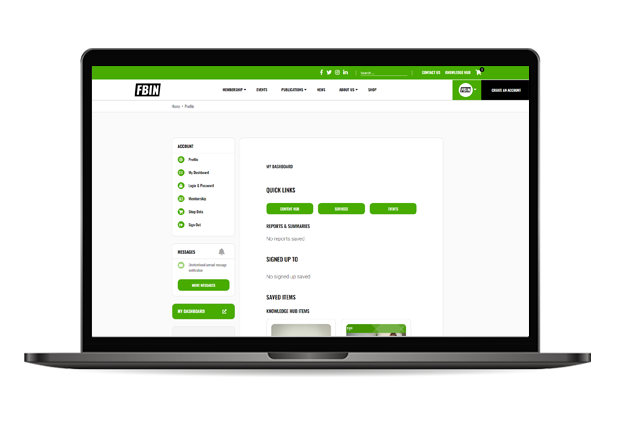
 Upgrade to Premium Now
Upgrade to Premium Now

